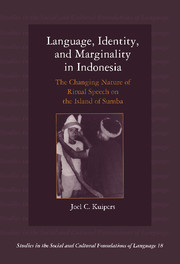 Language, Identity, and Marginality in Indonesia
Language, Identity, and Marginality in Indonesia Book contents
- Frontmatter
- Contents
- List of plates
- List of figures and tables
- Preface
- Acknowledgements
- Notes on orthography
- 1 Introduction
- 2 Place, identity, and the shifting forms of cultivated speech: a geography of marginality
- 3 Towering in rage and cowering in fear: emotion, self, and verbal expression in Sumba
- 4 Changing forms of political expression: the role of ideologies of audience completeness
- 5 Ideologies of personal naming and language shift
- 6 From miracles to classrooms: changing forms of erasure in the learning of ritual speech
- 7 Conclusions
- Notes
- Appendix
- References
- Index
- STUDIES IN THE SOCIAL AND CULTURAL FOUNDATIONS OF LANGUAGE
1 - Introduction
Published online by Cambridge University Press: 05 July 2011
- Frontmatter
- Contents
- List of plates
- List of figures and tables
- Preface
- Acknowledgements
- Notes on orthography
- 1 Introduction
- 2 Place, identity, and the shifting forms of cultivated speech: a geography of marginality
- 3 Towering in rage and cowering in fear: emotion, self, and verbal expression in Sumba
- 4 Changing forms of political expression: the role of ideologies of audience completeness
- 5 Ideologies of personal naming and language shift
- 6 From miracles to classrooms: changing forms of erasure in the learning of ritual speech
- 7 Conclusions
- Notes
- Appendix
- References
- Index
- STUDIES IN THE SOCIAL AND CULTURAL FOUNDATIONS OF LANGUAGE
Summary
When the third world … begins to modernize … a very old phenomenon, as old as the displacement of the American Indians, the Australian Aborigines, the Bushmen, the Bedouins, the Lapps, the Gypsies, gets a new lease on life. Those people who lack or who are denied the means of participating in such modernization, or who simply reject the terms on which it is offered, become marginal, and this leads to the creation of encapsulated societies, societies viewed by the majority population in the countries in which they live as “backward,” “traditional,” “archaic,” “static,” or “primitive.” Go-ahead states, bent on “take-off,” do not bring all their citizens with them when they join the contemporary world of capital flows, technology transfers, trade balances and growth rates.
(Geertz 1994: 3)When I returned to the Weyewa highlands of the eastern Indonesian island of Sumba in 1994, I was surprised to learn that one of the most renowned and skilled practitioners of an elaborate and lively style of poetic ritual speech had converted to Christianity. With a wide, red, betel-stained grin, he held out his hand in the modern Indonesian style, and said, self-mockingly, “[allow me to] make your acquaintance, [I'm] David” (“kenalkan dulu: Daud”), then touched his hand to his breast after the Muslim practice. David! I was fascinated, because, when I first met him in 1978, he had been one of the most defiant towards the government's intense programs of educational, religious and political modernization and development.
- Type
- Chapter
- Information
- Language, Identity, and Marginality in IndonesiaThe Changing Nature of Ritual Speech on the Island of Sumba, pp. 1 - 21Publisher: Cambridge University PressPrint publication year: 1998
